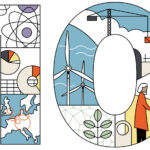Understanding Blockchain, Cryptocurrency, and Digital Assets
Blockchain technology and cryptocurrencies have become some of the most transformative innovations of the digital age, sparking widespread interest among businesses, regulators, and consumers alike. To understand their significance, it’s essential to grasp their fundamental concepts, potential benefits, current challenges, and future applications.
What is Blockchain Technology?
At its core, a blockchain is a decentralized digital ledger that records transactions across a peer-to-peer network. Unlike traditional ledgers maintained by a central authority, blockchain operates without a single controlling entity, relying instead on a distributed consensus mechanism. This structure ensures that all participants in the network have access to the same information, fostering transparency and trust.
Potential applications of blockchain extend beyond cryptocurrencies, including supply chain management, sustainability initiatives, fund transfers, and digital asset tokenization. Its capacity for accurate tracking and permanent record-keeping makes it a versatile tool for various industries.
Understanding Cryptocurrencies
Cryptocurrencies are digital mediums of exchange that utilize blockchain technology for verification and security. The most well-known example is Bitcoin, which was created as a decentralized digital currency. Unlike traditional money, cryptocurrencies have no intrinsic value or physical form; they exist solely within the digital realm.
The creation of new units is governed by algorithms and protocols rather than central banks, making the supply of cryptocurrencies inherently decentralized. However, their lack of intrinsic value and regulatory uncertainty pose challenges to widespread adoption and stability.
Benefits of Blockchain
- Increased Transparency: The transparent nature of blockchain allows all participants to verify transactions independently, reducing the risk of fraud.
- Accurate Tracking: Blockchain’s immutable ledger enables precise tracking of assets, goods, or data through complex supply chains or financial transactions.
- Permanent Records: Once recorded, data on the blockchain cannot be altered, ensuring auditability and trustworthiness.
- Cost Reduction: By eliminating intermediaries and streamlining processes, blockchain can lower operational costs across sectors.
Current Challenges and Unknowns
Despite its promising potential, blockchain faces several hurdles:
- Technological Complexity: Implementing and managing blockchain solutions require specialized expertise and infrastructure.
- Regulatory Uncertainty: Governments and regulators are still formulating policies, which can impact adoption and innovation.
- Implementation Challenges: Integrating blockchain into existing systems can be complex and resource-intensive.
- Competition Between Platforms: Multiple blockchain protocols and platforms exist, leading to fragmentation and uncertainty about standards.
Transformative Applications Across Industries
Supply Chain Management
Blockchain can enhance visibility by tracking individual components from origin to final product, improving accountability and reducing fraud. For example, in food safety, blockchain enables real-time monitoring of the entire supply chain, ensuring product authenticity and safety.
Travel and Logistics
Corporations can reduce costs by directly working with airlines and travel providers, eliminating intermediaries. Blockchain facilitates secure, transparent tracking of travel arrangements, loyalty points, and reimbursements.
Sustainability and Resource Management
Decentralized data collection through blockchain can optimize resource management, support sustainability goals, and improve environmental reporting. This technology allows for more accurate measurement of carbon footprints and resource usage, promoting transparency in corporate sustainability efforts.
Financial Inclusion
Blockchain and cryptocurrencies can provide access to capital for underserved populations, enabling funding for projects and businesses that traditional banking systems might overlook. This capacity fosters economic growth and democratizes financial opportunities.
Beyond Digital Assets: Blockchain as a Business Process Tool
From a corporate perspective, blockchain is increasingly viewed as a next-generation business process enhancement tool. Its ability to lower the “cost of trust” by enabling secure, transparent, and tamper-proof transactions can radically improve inter-company processes, supply chains, and contractual arrangements. This perspective suggests that investing in blockchain technology could yield higher returns than traditional internal projects, given its capacity to streamline operations and reduce risks.
The Future of Cryptocurrencies and Digital Assets
As digital assets evolve, understanding their mechanics becomes vital for businesses and investors. Resources that demystify cryptocurrencies and explore their potential are increasingly available, offering insights into how these assets may reshape financial markets. Key trends for the coming years include the development of Web3 technologies, which aim to decentralize the internet further, and the integration of blockchain into sustainability strategies.
Regulatory developments will continue to influence the growth of digital assets, emphasizing the importance of strategic planning and compliance for organizations venturing into this space. Custody solutions, security protocols, and clear legal frameworks are emerging as critical components for financial institutions and other stakeholders.
Regulatory and Strategic Considerations
While blockchain’s potential to disrupt industries is significant, its adoption requires careful navigation of legal, regulatory, and technological landscapes. Companies need to develop comprehensive strategies that address compliance, security, and interoperability challenges. Thought leadership and expert guidance will be essential in leveraging blockchain’s benefits while mitigating risks.




